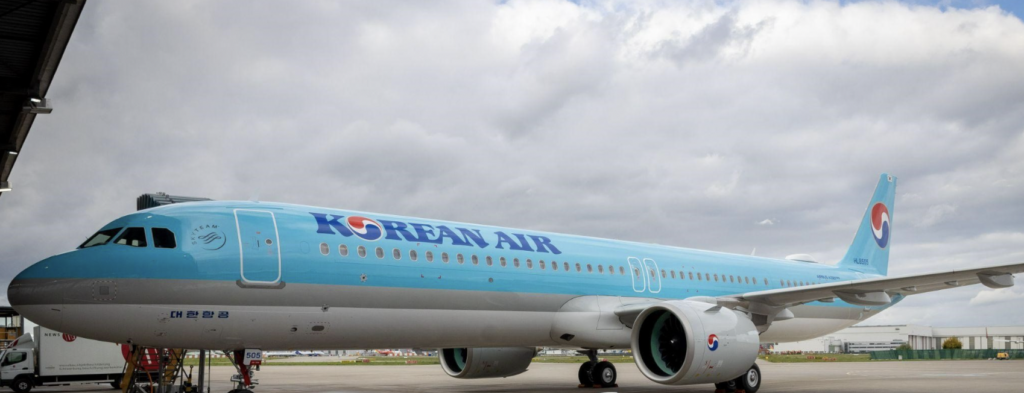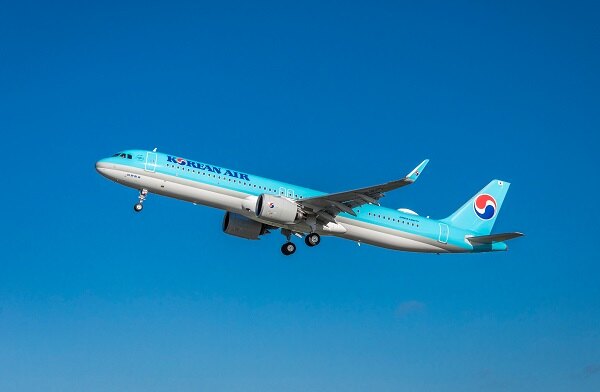Korean Air Expands In-Flight Wi-Fi Connectivity


Korean Air now offers Wi-Fi access on 11 aircraft in its fleet. (Photo: Airbus)
Korean Air, the national carrier of South Korea, is progressing in its initiative to offer in-flight Wi-Fi connectivity to 100% of its international flights, as per industry reports from Sunday. The airline’s recent incorporation of in-flight Wi-Fi on select Airbus A321neo aircraft underscores its commitment to enhancing the passenger experience.
As of this week, six of Korean Air’s Airbus A321neo aircraft have been equipped with in-flight Wi-Fi capabilities. These aircraft predominantly service routes connecting Incheon with Fukuoka, Phnom Penh, and Ho Chi Minh. They also operate on the Gimpo-Haneda route.
This is part of Korean Air’s phased strategy to broaden its in-flight connectivity offerings. Out of the airline’s fleet of 134 aircraft, a total of 11 now offer plans for connecting to in-flight Wi-Fi.
The connectivity rollout began in June when Korean Air introduced in-flight Wi-Fi on its five Boeing 737 Max 8 planes.

An Airbus A321neo (Photo: Korean Air)
This announcement aligns with a broader industry trend of airlines seeking to improve the in-flight experience for passengers. With the rising demand for constant connectivity, even in the air, airlines globally are acknowledging the commercial and customer service value of offering in-flight Wi-Fi services.
In-flight connectivity in 2023 is focused on enhancing the passenger experience beyond current capabilities, according to an article by David Helfgott, CEO of SmartSky Networks.
Pricing for Korean Air’s in-flight Wi-Fi services varies based on the length of the journey. For long-haul trips, Wi-Fi will cost $20.95 for the entire duration of the flight, and a two-hour Wi-Fi plan is available for $10.95. Flights destined for Japan, China, and other Northeast Asian regions have a full-flight Wi-Fi service priced at $11.95.
The airline also offers a plan for basic connectivity services. Priced at $4.95, this option is offered for passengers looking to stay connected to messaging and chat services during short-distance trips.
Korean Air’s tiered pricing strategy appears to cater to a diverse passenger base, recognizing both the casual user wanting to send messages and the business traveler needing consistent connectivity on longer routes. The differentiation in pricing based on the destination may be based on route popularity and demand elasticity.
In comparison, these are a few of the in-flight connectivity and entertainment offerings for commercial airlines in the U.S.:
Southwest’s Inflight Entertainment Portal features a flight tracker, texting, movies, TV, and live TV for free. Full-flight Wi-Fi service is available for $8 per device.
United offers Wi-Fi for $8 for MileagePlus members on U.S. domestic and short-haul international flights (Mexico and Canada). The service costs $10 for non-members. United also offers a library of movies and TV shows, for viewing on a personal entertainment device, at no cost.
Wi-Fi is available on almost all American Airlines routes for $10 (or $49.95 for a monthly subscription plan). Wi-Fi, texting, and streaming are free for T-Mobile customers on most domestic flights.
Delta Air Lines is rolling out free Wi-Fi (with Viasat) for SkyMiles Members, which will be available on all domestic and international flights by the end of 2024. Delta’s in-flight entertainment is available for free via seatback screens and includes up to 18 channels of live satellite TV in addition to movies, TV shows, podcasts, music, and games.
—————
Boost Internet Speed–
Free Business Hosting–
Free Email Account–
Dropcatch–
Free Secure Email–
Secure Email–
Cheap VOIP Calls–
Free Hosting–
Boost Inflight Wifi–
Premium Domains–
Free Domains





